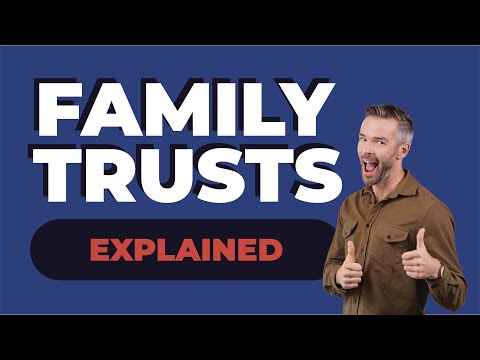Understanding Familytrust: The Basics Before the Truths
What Constitutes a Family Trust and Its Primary Functions
A family trust is essentially a fiduciary arrangement—a game of financial chess, if you will—where a trustor appoints a trustee to manage assets for beneficiaries, who often include children, grandchildren, or other family members. The trust is a chameleon of sorts; it can change its colors, adapting to the evolving needs and circumstances of a family.
Typically, these trusts are woven into the very fabric of estate planning to ensure that when the executor of the will joins the ranks of the dearly departed, their assets are allocated according to their last wishes. It’s like putting your financial affairs into the hands of someone you trust to distribute your treasure trove when you’re not around to oversee the job.
Varieties of Family Trusts: Revocable vs. Irrevocable Trusts
Now, let’s dive into the types of family trusts. They’re primarily classified as either revocable or irrevocable. The revocable trust is akin to writing in a pencil; you can erase and rewrite as needed. You retain control and can alter the beneficiaries, conditions, or simply dismantle the trust during your lifetime.
In contrast, the irrevocable trust is ink tattooed on the skin of your legacy. Once established, even if you have a change of heart, it is steadfast and virtually unchangeable. It’s a commitment etched in stone that demands careful consideration from the get-go.

The First Insane Truth About Familytrusts You Never Expected
Tax Advantages of Family Trusts: A Deep Dive into Fiscal Benefits
Family trusts, they’re not just about keeping familial ties intact; they’re also strategic financial fortresses shielding you from the arrows of hefty taxes. By transferring assets into a familytrust, you might lessen the load when tax season rolls around. It’s a form of fiscal gymnastics, where assets are passed on without getting slapped with an estate or gift tax.
Beneficiaries, who feel like they’ve hit the jackpot when they receive their inheritance via a trust, potentially bypass excessive taxation. It keeps more green in the family garden, so to speak, shielding the wealth nurtured over a lifetime from wilting away.
Example Spotlight: How the Walton Family Trust Manages Wealth
Let’s peek at the Waltons, the family behind the behemoth Walmart. They’ve elegantly choreographed the dance of their assets into a family trust. With billions at stake, the Waltons have utilized trusts not only to sustain their empire across generations but also to invest smartly and reduce their tax bonanza in extraordinary ways.

| Aspect | Details |
| Definition | A legal entity set up to manage assets for the benefit of family members designated by the grantor. |
| Primary Beneficiaries | Children, grandchildren, siblings, spouse, or other relatives of the grantor. |
| Types | – Revocable: Can be altered or terminated by the grantor during their lifetime. – Irrevocable: Cannot be changed once established. |
| Purposes | – Estate planning – Asset protection – Tax planning – Providing for family members with special needs |
| Management | Handled by a Trustee, who is responsible for managing and distributing the trust’s assets according to the trust document. |
| Common Risks | – Trustees claiming excessive fees – Poor investment decisions – Failure to consider tax implications |
| Fees | – Ongoing Trustee fees – Potential legal fees for trust defense – Tax preparation and filing costs |
| Tax Considerations | – Trust may be required to file an annual tax return – Specific tax treatment for revocable vs irrevocable trusts |
| Estate Planning Benefits | – Avoidance of probate – Can provide asset protection from creditors and divorce proceedings – Potential tax advantages |
| Potential Drawbacks | – Setup and maintenance costs – Complexity and need for professional support – Lack of flexibility with irrevocable trusts |
| Considerations for Appointor | – Ensuring the Trustee acts in the best interest of beneficiaries – Monitoring the Trust’s investments and taxation |
The Second Truth: Control Beyond the Grave
Unveiling the Control Aspects of a Family Trust
The hereafter has no say in earthly matters, right? Well, a family trust turns that notion on its head. By establishing a trust, you’re virtually extending your influence from the beyond, instructing precisely how and when beneficiaries can dip their hands into the cookie jar.
For instance, you could decree that your grandkids get access to their share only once they hit a milestone—say, when they graduate from college or tie the knot. It’s a way of ensuring that your hard-earned wealth becomes a tool for positive growth rather than a free-for-all splurge fest.
Case Study: The Rockefeller Family Trust Strategy
The Rockefellers wrote the playbook on family trusts. Their strategic use of trusts allowed them to maintain a grip on their fortune and influence long after the oil tycoon, John D. Rockefeller, passed away. The assets were smoothly transitioned while preserving the family’s financial stronghold and philanthropic pursuits, all neatly bound by the trust’s legal framework.

Truth Number Three: Beneficiaries vs. Trustees – The Power Struggle
Defining Roles: Who Holds the Reins in Family Trusts?
In a familytrust, there’s an intricate balancing act at play between beneficiaries and trustees. The trustee is the ringmaster, tasked with juggling the wishes of the trustor and the interests of the beneficiaries. They must walk a tightrope, faithful to the trust’s terms, all the while ensuring the financial prosperity of the assets contained within.
But let’s not put on rose-colored glasses here. This balance can tip, and when it does, it often leads to a tug-of-war where one or more parties may feel slighted, prompting a legal scuffle to redefine control.
Analyzing the Murdoch Family Trust Dynamics
Rupert Murdoch’s family trust is a prime-time drama unto itself. With his media empire’s future at stake, Murdoch has had to navigate the turbulent waters of balancing his heirs apparent, with trust interests often keeping the plot thick with tension. How this family trust balances power and ensures fairness is an ongoing narrative watched closely by financial and entertainment pundits alike.

A Fourth Hidden Reality: Family Trusts and the Probate Paradox
The Probate Process Explained and How Family Trusts Circumvent It
The term probate might draw blank stares, but it’s essentially the court procedure to clink glasses on a will’s legitimacy. It can be as pleasant as a root canal—public, time-consuming, and costly. But family trusts sidestep this entirely, acting as a secret passage that transfers assets smoothly—sans probate. Trustees can distribute the wealth according to the trust’s prescriptions, all away from the public eye and probate’s pesky tentacles.
Comparing the Probate Experiences of With-Trust vs. Without-Trust Estates
Imagine two estates waving goodbye to their progenitors: one fortified by a trust, the other bare without. The unprotected estate undergoes probate, its dirty laundry—a list of debts, inheritors, and assets—aired for the public to scrutinize. In contrast, the trust-wrapped estate silently hands over the baton to the heirs, untouched by the clamor of the courts.

Truth Five: The Sheer Financial Cost of Establishing a Familytrust
A Breakdown of Trust Establishment Costs
While a familytrust might feel like a financial suit of armor, crafting it isn’t free. There’s an outlay involved—a sacrifice to the money gods, if you will—ranging from the initial setup fees to the ongoing management costs. Think legal advice, trustee honorariums, and potentially, tax return preparation costs. Each trust is a tailor-made garment, and the price is just as bespoke.
Real-World Cost Analysis: The Bezos Family Trust Formation Expenses
Taking a leaf from Jeff Bezos’s book, when Amazon’s kingpin structured a trust, you can bet there were commas in the bill. Legal eagles with expertise enough to navigate through a financial Amazon jungle don’t come cheap. Adding to that, the costs to maintain the trust’s health with yearly filings, strategic investments, and occasional legal defenses—if required—are not for the faint of heart or light of wallet.
The Sixth Startling Fact: Privacy Protection – A Closer Look
Private Affairs: How Family Trusts Keep Matters Confidential
Fling wide the gates of privacy, and you’ll find the familytrust standing as a stalwart guardian. Unlike a will that becomes as public as a sarah Rafferty performance once it enters probate, trusts keep your secrets well, secret. It’s a financial diary locked away, protecting both the dignity of the deceased and the beneficiaries from unwelcome prying eyes.
Privacy vs. Publicity: Zuckerberg’s Familytrust vs. Celebrity Estates
Picture the contrast: Mark Zuckerberg’s trust is like big Lex baddie collection, exclusive and elusive, versus a celebrity’s probated estate, sprawled across headlines like Bridgerton season 3 updates. Unshielded estates invite scrutiny, opening up the legacy to a spectacle as anticipated as across The spider verse streaming, while a well-structured trust preserves the privacy of financial affairs.
The Seventh Insane Truth: The Impact of Familytrusts on Heir Relationships
Sibling Dynamics and Succession Planning Within Trusts
When it comes to family trusts, it’s not all sunsets and roses. The process of succession planning—deciding who gets what—can stir the pot of familial ties, sometimes putting siblings at odds. It’s a substantial reason why handling a trust requires razor-sharp precision and a copious amount of tact.
Lessons From the Hearst Family Trust: A Legacy of Litigation
Lift the curtain on the Hearst family, and you’ll witness a courtroom drama more riveting than any soap opera plotline. After William Randolph Hearst’s death, his trust became the battleground for the ensuing generations, struggling over control and shares, a testament to how trusts can indeed shape the dynamics between heirs for better or worse.
Conclusion: The Complex Fabric of Familytrusts Unraveled
Summarizing the Insane Truths of Familytrusts
Familytrusts are formidable fiscal tools, deftly capable of tax mitigation, probate avoidance, and posthumous control—yet fraught with potential familial discord and steep financial implications. They’re a financial forcefield, preserving privacy and enabling wealth transition sans the public spectacle.
However, the intricate inner workings warrant expert guidance to navigate the murky waters of setting up trust which amidst diminishing returns and competitive financial landscapes remains a valuable, albeit scrutinized mechanism.
Considering Family Trusts: A Next Step
You’re standing at a crossroads between letting your assets ride into the sunset unguarded or wrapping them in the complex, protective embrace of a family trust—a trust that acts much like an heirloom, holding within it the potential for financial security and familial harmony, or discord. The choice is as personal as it is intricate. If you want to know How Does a trust work, and whether a family trust weaves into the tapestry of your legacy, consult a financial maestro—someone who harmonizes your wishes with the legal sonnet that is trust law. It’s not just about writing checks and signing documents; it’s about scripting the financial future of generations to come.
Unveiling the Eccentricities of Familytrust
Family trusts, huh? Sure, they sound as dry as a Thanksgiving turkey with no gravy, but hold onto your hats folks because there are some wild nuggets about these financial fowl that’ll make you sit up and pay attention!
The Time-Capsule Cash Stash
Alright, let’s kick things off with a brain-tickler. Did you know that a familytrust can act like a time capsule, but for cold hard cash? Yep, it’s the stuff of sci-fi movies! You can set it up, toss in your treasures (or, you know, money and property), and then — poof! It stays locked away for years or even generations. Imagine cracking that baby open in the future; it’s a financial blast from the past!
When Bloodlines Blur…
Ever heard the phrase ‘keeping it in the family’? Well, with familytrusts, things get a bit… messy. People sometimes think trusts are only for their offspring, but surprise! You can actually include friends, charities, and sometimes even your beloved pooch in the beneficiary mix. That’s right, Fido could be living the high life on your dime. Pass the kibble, Jeeves!
“As Seen On Screen: Family Drama and Trust Funds”
Now let’s get a little Hollywood, shall we? Familytrusts aren’t just for the uber-rich or fictional characters. But speaking of fiction, remember Joanne Whalley, that sultry siren of the screen? Her roles might seem worlds away from the nitty-gritty of estate planning, but trust us, the dramas that unfold around inheritance in real life can rival any plotline in her films. It’s got all the betrayal, secret benefactors, and emotional outbursts you could want, minus the mood lighting and musical score.
The Taxman Cometh… Or Does He?
Hold onto your calculators, because familytrusts can be a real roller coaster ride when it comes to taxes! In some magical cases, setting up a trust correctly can keep the taxman at bay. It’s like having an invisibility cloak for your cash, where you can dodge some taxes like a pro. But be careful – botch the spell and you might find Uncle Sam knocking on your door, demanding a piece of the pie.
“Trust” is the Name, Protection is the Game
Ever wanted a financial bodyguard for your hard-earned dough? That’s where the familytrust comes strutting in. It’s not just about passing along wealth; it’s about protecting it too. Creditors, lawsuits, even angry ex-spouses might as well be rain to a well-built umbrella when you have a trust shielding your assets.
You Can’t Take It with You… Or Can You?
Here’s a cheeky thought: with a familytrust, it’s kind of like you can rule from beyond the grave. Eerie? Maybe. Awesome? Definitely. You get to call the shots on who gets what, how much, and when. It’s like you’re the puppet master of your own financial theater. Lights, camera, inheritance!
The Twist of the Trustee
And for our final act: the trustee. Ah, the trusted trustee, handed the keys to the kingdom (your kingdom, to be precise). They’re the ones making sure everything goes according to plan. But here’s a tongue-twister and brain-teaser rolled into one: the trustee can sometimes be a beneficiary, too! Talk about wearing multiple hats or, you know, balancing the checkbooks.
And there you have it, folks! Who would’ve thought familytrusts were such a curious blend of old-timey safeguards and modern financial wizardry? So the next time you’re thinking about trusts, remember: they’re not just dull legal documents – they’re the guardians of fortunes, with a side order of drama and a dash of immortality. Who knew finance could be such a hoot?

What is the purpose of a family trust?
What is the purpose of a family trust?
Ah, family trusts, they’re like safety nets for your loved ones’ future. Set up by someone, affectionately known as the grantor, the main goal is to ensure that their nearest and dearest—think kids, grandkids, and even old Uncle Joe—get a slice of the pie when they shuffle off this mortal coil. It’s a slick way to manage and dish out assets in the family like a well-oiled machine, with the option to tweak things (if it’s revocable) or set them in stone (if it’s irrevocable).
What is the downside of a family trust?
What is the downside of a family trust?
Now, don’t be fooled into thinking it’s all sunshine and rainbows. The downside of a family trust? Hold onto your hats—there’s a laundry list! Ongoing fees for the guardian of your financial castle, the Trustee, can take a bite out of your wallet. And if things go sideways, you might need a lawyer to jump into the fray. Plus, every year, the Trust has to talk taxes, which means coughing up dough for prep and filing. Not exactly a walk in the park, right?
What are the risks of a family trust?
What are the risks of a family trust?
Let’s not beat around the bush—there are risks in running a family trust. Those smooth-operating trustees could start charging an arm and a leg. They might make a hash of investments, draining the coffers with bad calls. And, heavens forbid, they sometimes don’t dot the i’s and cross the t’s on tax stuff, leading to a financial headache. Talk about a can of worms opened, eh?
What are the benefits of a family trust?
What are the benefits of a family trust?
Okay, time for the good news! Family trusts come with a boatload of perks. They’re like the superheroes of estate planning—protecting your assets from creditors, bypassing the drag of probate, and sometimes even cutting down estate taxes. And let’s not forget the control they give you over who gets what and when. So, in the long run, these benefits can make a family trust a real jewel in your financial crown.
What assets should not be in a trust?
What assets should not be in a trust?
Heads up! Not everything plays nice with trusts. There are a few things, like retirement accounts and medical savings accounts, that just don’t gel with the trust territory—you’d be stirring up a tax hornet’s nest. High-maintenance stuff, like cars, can also be more trouble than they’re worth to include. So, keep it simple; trusts are for assets that’ll stick around, not those that come and go faster than a hiccup!
What type of trust is best for a family?
What type of trust is best for a family?
Deciding on the right trust for your family is like picking the perfect ice cream flavor—there’s no one-size-fits-all. But generally, revocable trusts steal the limelight. They’re flexible; you can change ’em as your life does. If you’re feeling more iron-clad, an irrevocable trust has that unchangeable oomph. Remember, it’s all about suiting your family’s needs to a tee.
Are family trusts worth it?
Are family trusts worth it?
Look, weighing if a family trust is worth its salt depends on your setup. If you’ve got assets that you want to hand off smoothly, a trust can be like a trusty compass navigating your estate through stormy waters. It can protect your assets, sidestep probate, and give you control from the grave. So, if these tick your boxes, then sure as eggs is eggs, a family trust could be a worthy treasure chest for your legacy.
Why are trusts considered bad?
Why are trusts considered bad?
Here’s the skinny: Trusts get a bad rap ’cause they can be as pricey as a high-end handbag. They’re not just a sign here and forget it deal; they need TLC to keep running smooth. That can mean lawyers, accountants, and, oh boy, the tax man gets involved. And, when trust funds are drier than a desert, the benefits can seem like a mirage. But really, it’s about weighing if the pros outshine the cons for your wallet.
Why do rich people put their homes in a trust?
Why do rich people put their homes in a trust?
Rich folks slip their homes into trusts like a secret handshake in high society. It’s all about privacy, dodging the probate bullet, and icing out creditors. Plus, they can control the keys to the castle from the great beyond, making sure their mansions go to the right heirs without outside fuss. Pretty smart cookie move, if you have the dough to back it up.
What is the difference between a trust and a family trust?
What is the difference between a trust and a family trust?
Well, here’s the scoop: A trust is the big umbrella—any setup where someone’s calling the shots on assets for someone else. A family trust? That’s the special branch where the fam bam benefits. You’re setting the stage for your relatives to inherit your loot, tailored just for them. It’s like your everyday trust went home to Mam and Pap.
Can you leave money in a family trust?
Can you leave money in a family trust?
Can you keep dough in a family trust? You betcha. It’s like a piggy bank for your legacy. Park your cash there, and it’ll stay snug as a bug, ready to be handed out to your kin according to your play-by-play. No sweat about it just sitting around; if you’ve set the rules, the trust can keep your greenbacks warm for eons.
Can a trustee be a beneficiary?
Can a trustee be a beneficiary?
A trustee being a beneficiary is like the coach playing in the game too. Sure, it can happen, but you gotta watch for conflicts of interest. Trusts are all about trust, so mixing roles need a sharp eye to keep it all above board. You don’t want the waters muddied by self-serving shenanigans, do you?
What is the pros and cons of a trust?
What is the pros and cons of a trust?
Diving into the trust pool? The pros: you’re in the driver’s seat after you kick the bucket, you can cut the tiresome probate process, plus there’s a potential tax break. The cons? The meter’s running on costs—trustees, tax returns, and legal fees. Plus, it’s as rigid as a starched shirt if it’s irrevocable. So, you’re playing a game of balances, really.
How are funds distributed from a trust?
How are funds distributed from a trust?
Getting funds out of a trust is like a well-choreographed dance. The Trustee calls the tune and doles out the cash to your beneficiaries based on your sheet music (the trust document). If it’s an outright gift, it’s one-and-done. If there are strings attached, they make sure the conditions you’ve laid out are met. Just like a maestro making sure every note hits the right spot.
How do you name a family trust?
How do you name a family trust?
Crafting a name for your family trust? It’s like planting your flag in the ground. Generally, it’s a mix of your family name, a splash of creativity, and a hint of what you’re aiming to do. “The Smith Family Trust” keeps it simple and classy. Just make sure it’s unique enough to stand out but not so wild it causes raised eyebrows at the bank.
What is the difference between a trust and a family trust?
What is the difference between a trust and a family trust?
It’s all in the family, folks! Any trust is just a place to keep your assets until they’re passed on. Now, a family trust, that’s a VIP room where your nearest and dearest—your kin—get the red-carpet treatment. This is where you lay down the law on how your clan will inherit your stuff when you’re singing with the choir invisible.
What are 3 advantages of a trust over a will?
What are 3 advantages of a trust over a will?
Three aces up the sleeve for trusts over wills? First off, trusts skip the probate queue, saving time and privacy. Next, they can be like a shield against legal challenges and creditors, keeping your assets safer than a squirrel’s nut stash. And third, you’ve got more control knobs to play with; it’s your rules, on your timeline, even after you’ve hit the road.
At what net worth does a trust make sense?
At what net worth does a trust make sense?
Talk about trust issues, eh? Deciding if a trust makes sense for you isn’t just about hitting a net worth number. It’s about your goals. Got a complex family tree, want to keep Uncle Sam’s fingers out of the pie, or looking to lay out clear rules from the great beyond? If that’s your game, then even with a modest pot of gold, a trust could be your winning ticket.
How does a beneficiary get money from a trust?
How does a beneficiary get money from a trust?
Getting cash from a trust isn’t like an ATM withdrawal. Once you’re the chosen one—a beneficiary—the Trustee plays ATC, directing the flow of funds based on the trust’s roadmap. If it’s all clear for landing—meaning you meet the trust’s conditions—they’ll release the funds. It could be a lump sum or in bits and bobs, just as the trust spells out.



